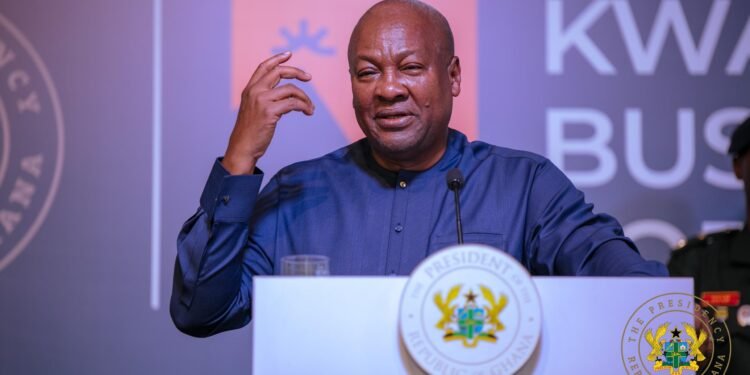The Chief Executive Officer of the Ghana Gold Board (Goldbod), Sammy Gyamfi, attributed the institution’s remarkable performance to the foresight of President John Mahama.
According to Gyamfi, it was under Mahama’s administration that the blueprint for Goldbod was first conceived born out of a deep concern over Ghana’s paradox of being resource-rich in gold yet consistently struggling with foreign exchange shortages.
“President Mahama recognized early on the need for Ghana to assert greater control over its gold resources.
“His vision laid the foundation for the reforms we are now witnessing.”
Sammy Gyamfi, Chief Executive Officer of the Ghana Gold Board (Goldbod)
Before GoldBod’s establishment, the CEO explained, both individuals and foreign firms dominated Ghana’s gold export market. Foreign entities, with their stronger financial muscle, controlled about 70% of the sector, often exploiting loopholes in regulation.

“Most of these entities were not complying with the rules. They would export gold but delay forex inflows. In many cases, the FX never came.
“Worse still, some used their licenses as cover for smuggling operations. Ghana was losing significant value while other countries recorded massive volumes from our small-scale sector.”
Sammy Gyamfi, Chief Executive Officer of the Ghana Gold Board (Goldbod)
The response, he noted, was a complete overhaul of the legal framework. Parliament passed the Ghana Gold Board Act in record time, with the President assenting on April 2, 2025. “Now, you cannot buy or export gold from Ghana as an individual, whether Ghanaian or foreigner,” Mr. Gyamfi stated firmly.
“The state has created a central agency responsible for all gold purchases, both small-scale and large-scale.
“For the large-scale companies, we purchase 20% of their output directly, which goes straight into our reserves at the Bank of England. For small-scale, no foreigner is allowed. If you attempt it, you face 10 to 15 years in prison.”
Sammy Gyamfi, Chief Executive Officer of the Ghana Gold Board (Goldbod)
Licensing Reforms and Tiered System

GoldBod has also introduced a tiered licensing system to regulate gold buyers according to their size and role in the value chain.
Tier One buyers are grassroots operators, often without offices, who purchase small quantities of gold while moving from village to village.
“They are very important to the chain. We have created special rules for them because they cannot be regulated like big players.”
Sammy Gyamfi, Chief Executive Officer of the Ghana Gold Board (Goldbod)
Tier Two buyers, on the other hand, are well-structured firms with multiple offices, financial capacity, and stricter compliance obligations. They undergo rigorous anti-money laundering and counter-terrorism financing checks before receiving licenses.
At the top of the chain are aggregators, the mega buyers who consolidate gold purchases for the GoldBod.
“We used to have four aggregators; today, only one has qualified under the strict new requirements.”
Sammy Gyamfi, Chief Executive Officer of the Ghana Gold Board (Goldbod)
This system, backed by enhanced oversight, including the appointment of GoldBod inspectors and a dedicated taskforce, has dramatically reduced smuggling.
Another major reform was the scrapping of the 1.5% withholding tax on unprocessed small-scale gold, a levy Mr. Gyamfi said had driven many operators into smuggling. “The removal of that tax, coupled with our fair pricing system, has made legal sales more attractive,” he explained.
“We’ve also introduced an efficient aggregation system.
“Within three days, funds from the Bank of Ghana are advanced through our aggregator to tiered buyers, and the gold is delivered to Accra for shipment. That is how we’ve been able to mop up record volumes.”
Sammy Gyamfi, Chief Executive Officer of the Ghana Gold Board (Goldbod)
Since the reforms began, GoldBod has purchased over 120 kilograms of large-scale gold directly into reserves, while small-scale contributions have surged under the new model.
A Vision of Sovereignty and Economic Transformation

Mr. Gyamfi emphasized that the reforms are not just about revenue but about reshaping Ghana’s economic independence.
“For years, our cedi depreciated alarmingly because we were always chasing dollars from external markets.
“Now, we are using our own resources to stabilize the currency, curb inflation, and improve living standards. That is what sovereignty over mineral wealth looks like.”
Sammy Gyamfi, Chief Executive Officer of the Ghana Gold Board (Goldbod)
He credited the success to collaborative efforts with stakeholders, including civil society leaders like Dr. Steve Manteaw, industry players such as Senyo Hosi, and associations of small-scale miners and traders.
“What we have achieved in such a short time is remarkable. “The GoldBod Act is hailed as one of the best pieces of legislation ever passed, and it is already transforming our economy.”
Sammy Gyamfi, Chief Executive Officer of the Ghana Gold Board (Goldbod)
As Ghana consolidates these gains, the GoldBod intends to deepen reforms, expand monitoring, and continue its crackdown on illegal gold trading. The CEO warned that no one, whether Ghanaian or foreign, would be spared if caught undermining the system.
READ ALSO: Market Cheers as Ghana’s Treasury Auction Breaks Four-Week Drought with 15.8% Oversubscription



















